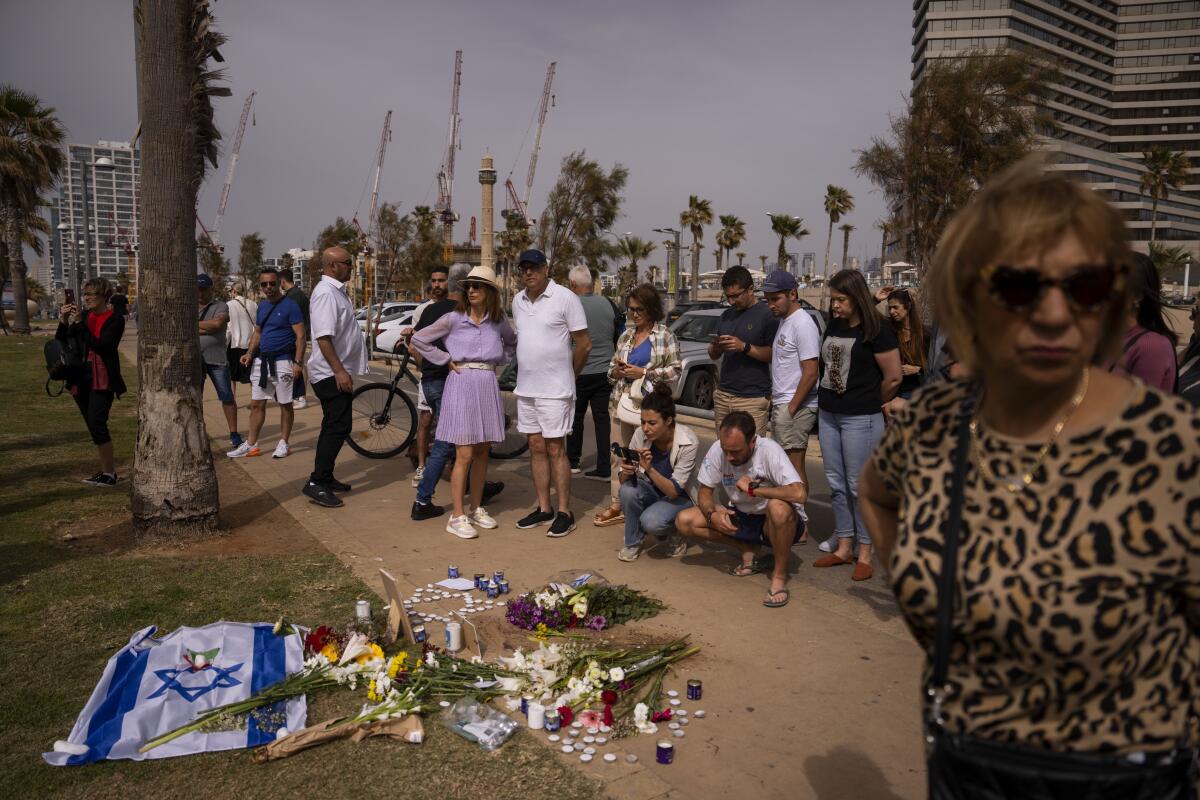Israeli military retaliates after rockets fired from Syria

- Share via
JERUSALEM — The Israeli military said its forces attacked targets in Syria early Sunday after six rockets were launched from Syrian territory in two batches toward Israel in a rare attack from Israel’s northeastern neighbor.
After the second barrage of three rockets, Israel initially said it responded with artillery fire into the area in Syria from where the rockets were fired. Later, the military said Israeli fighter jets attacked Syrian army sites, including a compound of Syria’s 4th Division and radar and artillery posts.
The rocket firings came after days of escalating violence on multiple fronts over tension in Jerusalem and an Israeli police raid on the city’s most sensitive holy site.
In the second barrage, which was launched early Sunday, two of the rockets crossed the border into Israel, with one being intercepted and the second landing in an open area, the military said. In the first attack, on Saturday, one rocket landed in a field in the Israeli-annexed Golan Heights. Fragments of another destroyed missile fell into Jordanian territory near the Syrian border, Jordan’s military reported.
There were no reports of casualties.
A Damascus-based Palestinian group loyal to the Syrian regime claimed responsibility for launching missiles at Israel on Saturday, reported Beirut-based Al-Mayadeen TV.
The report quoted Al-Quds Brigade, a militia different from the larger Palestinian Islamic Jihad’s armed wing with a similar name, as saying it fired the rockets to retaliate for a police raid on Al Aqsa Mosque.
In Syria, an advisor to President Bashar Assad described the rocket strikes as “part of the previous, present and continuing response to the brutal enemy.”
Israel, which has vowed to stop Iranian entrenchment in Syria, has carried out hundreds of strikes in government-controlled parts of that country in recent years, though it rarely acknowleges them. Before the latest strikes, Syrian officials had attributed 10 attacks to Israel this year, some of which put the Damascus and Aleppo airports temporarly out of service and killed civilians as well as Syrian soldiers and Iranian military advisers.
In the occupied West Bank, Israeli security forces shot and killed a 20-year-old Palestinian in the northern occupied West Bank, Palestinian health officials said. The Israeli military said it opened fire at Palestinians hurling stones and explosive devices at troops. The Palestinian Health Ministry identified the Palestinian killed as Ayed Salim.
His death came at a time of unusually heightened violence in the West Bank. Israeli fire has killed more than 90 Palestinians this year, at least half affiliated with militant groups, according to a tally by the Associated Press.
Palestinian attacks on Israelis have killed 19 people in that time — including on Friday two British Israelis shot to death near a settlement in the Jordan Valley and an Italian tourist killed by a suspected car-ramming in Tel Aviv. All but one were civilians.
California officials say they want federal disaster relief for the state’s salmon fishing industry after the 2023 fishing season for fall-run Chinook or king salmon was closed for much of the West Coast.
The rocket fire from Syria comes against the backdrop of soaring Israeli-Palestinian tensions touched off by an Israeli police raid on Jerusalem’s most sensitive site, the sacred compound home to the Al Aqsa Mosque. That outraged Palestinians marking the holy fasting month of Ramadan and prompted militants in Lebanon — as well as Palestinian militants in the Gaza Strip — to fire a heavy barrage of rockets into Israel. In retaliation, Israeli warplanes struck sites allegedly linked to the Palestinian militant group Hamas in Gaza and southern Lebanon.
In retaliation, Israeli warplanes struck sites allegedly linked to the Palestinian militant group Hamas in Gaza and southern Lebanon.
On April 1, a few hundred Palestinian worshipers barricaded themselves in the mosque — which sits on a hilltop in the heart of Jerusalem’s Old City sacred to both Muslims and Jews. Israeli police efforts to evict the worshipers locked in the mosque overnight with stockpiled firecrackers and stones spiraled into unrest in the holy site earlier last week.
The latest escalations prompted Israeli Defense Minister Yoav Gallant to extend a closure barring entrance to Israel for Palestinians from the occupied West Bank and Gaza Strip for the duration of the Jewish holiday of Passover, while police beefed up forces in Jerusalem on the eve of sensitive religious celebrations.
In a separate incident in the northern West Bank city of Nablus late Saturday, a leader of a local independent armed group known as the Lion’s Den claimed the group executed an alleged Israeli collaborator who had tipped off the Israeli military to the locations and movements of the group’s members. Israeli security forces have targeted and killed several of the group’s key members in recent months.
The accused man’s killing could not be immediately confirmed, but videos in Palestinian media showed medics and residents gathered around his bloodied body in the Old City, where the Lion’s Den holds sway. “Traitors have neither a country nor a people,” Lion’s Den commander Oday Azizi said in a statement.
The moves come at a time of heightened religious fervor — with Ramadan coinciding with Passover and Easter celebrations. Jerusalem’s Old City, home to key Jewish, Muslim and Christian holy sites, has been teeming with visitors and religious pilgrims from around the world.
Gallant said that the closure imposed Wednesday, on the eve of Passover, would remain in effect until the holiday ends on Wednesday night. The order prevents Palestinians from entering Israel for work or to pray in Jerusalem, though mass prayers were permitted at the Al Aqsa Mosque on Friday. Gallant also ordered the Israeli military to be prepared to assist Israeli police. The army later announced that it was deploying additional troops around Jerusalem and in the West Bank.
More than 2,000 police were expected to be deployed in Jerusalem on Sunday, when tens of thousands of Jews are expected to gather at the Western Wall for the special Passover priestly blessing. The Western Wall is the holiest site where Jews can pray and sits next to the Al Aqsa Mosque compound, where large crowds gather each day for prayers during Ramadan.
Jerusalem‘s police chief, Doron Turgeman, met with his commanders Saturday for a security assessment. He accused the Hamas militant group, which rules the Gaza Strip, of trying to incite violence ahead of Sunday’s priestly blessing with false claims that Jews planned to storm the mosque.
“We will allow the freedom of worship and we will allow the arrival of Muslims to pray,” he said, adding that police “will act with determination and sensitivity” to ensure that all faiths can celebrate safely.
The current round of violence erupted earlier in the week after Israeli police raided the mosque, firing tear gas and stun grenades to disperse hundreds of Palestinians who had barricaded themselves inside. Violent scenes from the raid sparked unrest in the contested capital and outrage across the Arab world.
More to Read
Sign up for Essential California
The most important California stories and recommendations in your inbox every morning.
You may occasionally receive promotional content from the Los Angeles Times.











